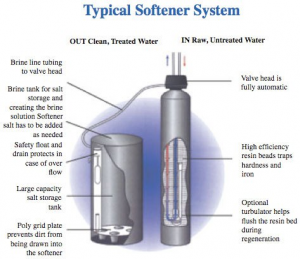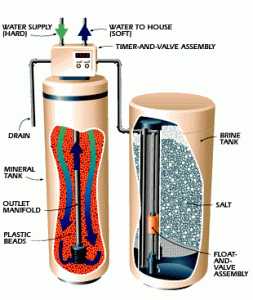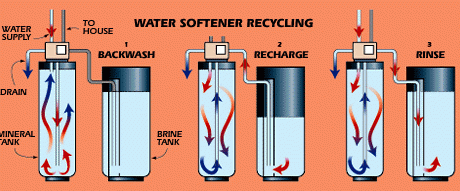Water Softeners
 The Central Coast is home to some of the hardest water in the Nation. Residents of Santa Barbara, Ventura, and Oxnard require water softeners calibrated for hardness levels in the range of 25 – 40 grains per gallon. “Big box” stores sell water softening equipment calibrated to 5 – 10 grains per gallon. Let Sol Wave Water install the proper water softener for your Central Coast water. We offer complete soft water solutions for business, residential, and commercial locations.
The Central Coast is home to some of the hardest water in the Nation. Residents of Santa Barbara, Ventura, and Oxnard require water softeners calibrated for hardness levels in the range of 25 – 40 grains per gallon. “Big box” stores sell water softening equipment calibrated to 5 – 10 grains per gallon. Let Sol Wave Water install the proper water softener for your Central Coast water. We offer complete soft water solutions for business, residential, and commercial locations.
 The Central Coast is home to some of the hardest water in the Nation. Residents of Santa Barbara, Ventura, and Oxnard require water softeners calibrated for hardness levels in the range of 25 – 40 grains per gallon. “Big box” stores sell water softening equipment calibrated to 5 – 10 grains per gallon. Let Sol Wave Water install the proper water softener for your Central Coast water. We offer complete soft water solutions for business, residential, and commercial locations.
The Central Coast is home to some of the hardest water in the Nation. Residents of Santa Barbara, Ventura, and Oxnard require water softeners calibrated for hardness levels in the range of 25 – 40 grains per gallon. “Big box” stores sell water softening equipment calibrated to 5 – 10 grains per gallon. Let Sol Wave Water install the proper water softener for your Central Coast water. We offer complete soft water solutions for business, residential, and commercial locations.Water Softening 101
Soft Water Rentals / Purchase
Water Softening is the removal of calcium, magnesium, iron and certain other metal cations in hard water by the use of a water softener. The resulting soft water is more compatible with soap and extends the lifetime of plumbing and appliances.
Why do I want a water softener?

#2- Soft Water for Your Skin, as soap tries to clean the hardness in water the combination creates “soap scum”, or soap curd. This waxy layer of soap and hardness deposits on everything… Does the Zest Squeaky Clean Feeling sound familiar? Often kids, and even adults, have adverse dry and itchy skin reaction from this layer depositing on the skin and in the fabric fibers of your laundry. This can be especially evident for people who suffer from eczema and psoriasis.
#3- Soft Water for Cleaning, Why fight with the spots on the shower doors, why have your dishes get foggy with hardness, why ruin the finish on your fixtures… Why spend all this time with harsh chemicals when you can simply prevent it from happening?
#4- Soft Water for Saving Money, water heaters use more energy when run on hard water. A water softener in your home or business will reduce your usage of soaps and detergents, eliminates the need for rinse-aids like JetDry, will extend the service life of your water using appliances, plumbing, and fixtures. How about extending the life of your clothing! Have colors return and fabrics retain the supple feeling!
Water softeners have two separate chambers, the resin tank and the brine tank, and use an ion-exchange process to remove the hardness ions calcium, iron and manganese. Softeners are often able to remove other impurities. Raw feed water is passed through a bed of resin “beads” inside the resin tank where the hardness ions in the feed water trade places on the resin beads with sodium ions that are electrostatic ally bound to the beads. Eventually, the resin exhausts its supply of sodium and must be “regenerated”. When the beads have no more room for additional calcium, iron and manganese ions, the unit temporarily goes off-line and the resin tank is flushed with salt water from the brine tank, the source of new exchangeable sodium ions. Although not typically used for residential customers, alternating-twin (progressive flow tri-plex through hexa-plex) water softeners are able to deliver consistent soft water 24/7.
Defining Hard Water
As it leaves the skies in the form of rain, water is soft, meaning it is clear if impurities. But is picks up carbon dioxide and other impurities in the air. It also dissolves calcium and magnesium salts
as it soaks through the earth and runs off into rivers or lakes and collects in reservoirs or wells. If the water, in these processes, picks up a substantial amount of invisible dissolved rock, calcium carbonate and other substances, it becomes “hard” a defined term.
Because the unique mixture of minerals dissolved in the water, its pH and temperature determine the effect of water hardness. Hardness is generally defined using this scale:
- Soft 0 – 60 mg/L as calcium carbonate or < 3.5 grains hardness per gallon (gpg)
- Moderate 61 -120 mg/L as calcium carbonate or 3.5 to 7.0 grains hardness per gallon (gpg)
- Hard 121 – 180 mg/L as calcium carbonate or 7.0 to 10.5 grains hardness per gallon (gpg)
- Very Hard > 180 mg/L as calcium carbonate or 10.5 grains hardness per gallon (gpg)
Benefits of Soft Water
- Personal Grooming – Hair washed in softened water is thoroughly clean, smooth, natural looking and easy to manage. Many people remember collecting rainwater in a barrel to use for
washing hair and clothing. There was a reason for it! Rainwater is naturally soft. How much are you spending on hair conditioner? Would you like that same bottle of conditioner and shampoo to last 5 times longer? Just think of the savings, and you get lovely hair!
- Clothing – Softened water can increase the serviceable life of clothing and linens while keeping them cleaner, softer and brighter. No need for bleach or fabric-softeners.
- Cleaning – Get things cleaner using less water and cleaning product. A full load of laundry should require only 1 tablespoon of laundry soap. A full load of dishes in a dishwasher should only need 1 teaspoon of basic powder. And yes, NO MORE JET DRY.
Soft Water and the Environment
The water softening flush release has come under fire from certain environmental quarters, even though it has not been proven to be a problem under most practical conditions. In response to these concerns, the Water Quality Association decided to study the environmental impact of conventional water softening. The goal of the study was simple, to determine whether ion exchange water softening is an eco-friendly technology that might be able to contribute to the efficiency of home heating technologies and result in a reduced carbon footprint. In order to carry to the study the prestigious Battelle Institute in Columbus Ohio was contracted to do the work.
The net results of the Battelle study proved, beyond any doubt that by maintaining a high level of efficiency, home water heaters, faucets, shower head and various appliances will use significantly less energy and result in a dramatically decreased carbon footprint. Appliances will last longer, also contributing to less waste and land fill and finally improved health by eliminating scaled surfaces that could harbor pathogenic bacteria.
Using less detergent and hot water also helps the environment. Another study for the Water Quality Association on detergents quantifies the difference water softening can make.
Washing machines can reduce detergent use by half, using 60-degree cold water instead of 100-degree hot water and get the same or even better stain removal. Dishwashers can run with up to 50 percent less detergent with better results!
Water softening – It’s good for you and the environment!
This page Specialty is soft water by using water softeners – We offer a full line of rental equipment and sale services to Santa Barbara, Montecito, Carpinteria, Hope Ranch, Goleta, Gaviota, Santa Ynez, Solvang, Los Olivos, Los Alamos, El Capitan, Mesa, Mission Canyon, and to the south, Beverly Hills, Malibu, Calabasas, Agoura & Agoura Hills, Thousand Oaks, Simi Valley, Moorpark, Somis, Camarillo, Oxnard, Ventura, Santa Paula, Ojai, Oak View, La Conchita and Rincon.
August 31, 2016 – Letter from Old Spanish Days
Dear Steve, Thank you for your participation in Old Spanish Days Fiesta 2016. We greatly appreciated your Silver Sponsorship.
Because of generous sponsors like you, we can continue to put on our beloved community festival, Fiesta. Together we can continue to honor,and preserve our history, heritage, culture, and traditions for generations to come… Your sponsorship helps to fund the many events we provide the community at no cost: Fiesta Flower Girls, La Fiesta Pequena, Las Noches de Ronda, Tardes de Ronda, El Desfile Historico.
Warmest Gratitude, Denise Sanford, Segunda Vice Presidente











